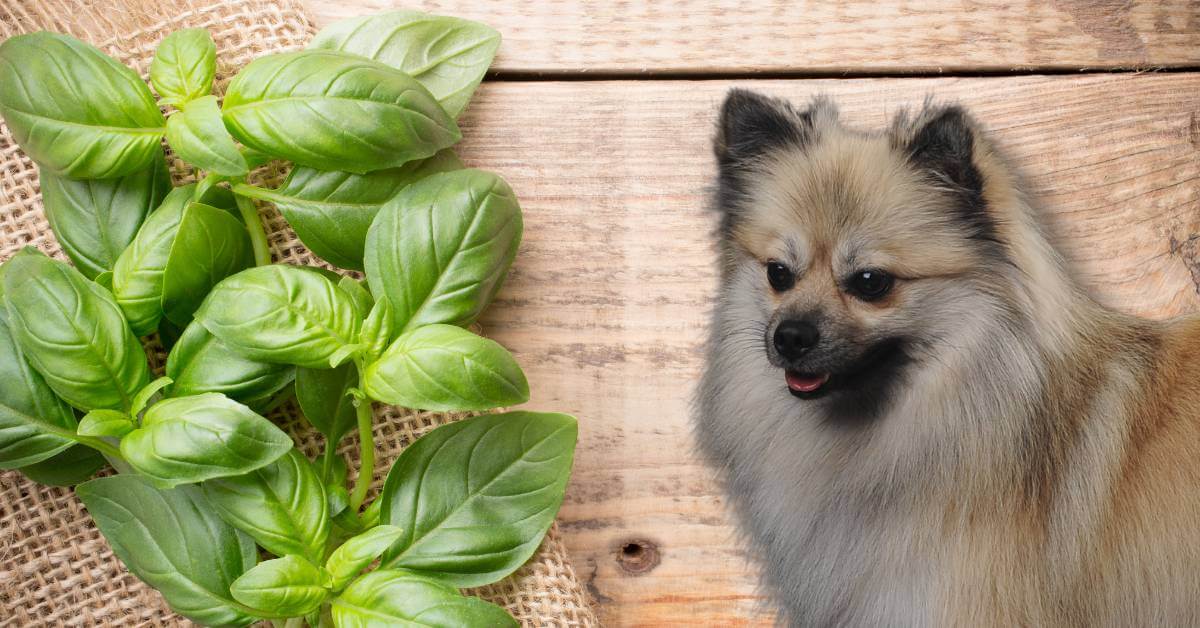Can Dogs Eat Basil?
Yes, dogs can eat basil! While it’s unlikely your dog is a master chef cooking cheesy Italian pasta with basil, they might find it fresh in your garden or a flower pot if you grow herbs in your apartment. They could also come across dried basil in your meals. Basil is generally safe for dogs and can even offer some health benefits, but as always, it’s best to feed it to them in moderation.

In this article, we’ll analyze both dried and fresh basil leaves, explore the effects of herbs on their digestion, and more. We’ll also explain why dogs like to eat fresh grass and herbs from your garden!
What happens if your dog eats basil?
Some dogs love to eat basil from the garden. It can make their breath smell great! You’ll see that quite often, dogs that like to eat basil like to eat fresh parsley! When dogs eat fresh herbs like basil, it can have a positive effect on their digestion. Basil is an anti-inflammatory herb and can help soothe your dog’s stomach. However, if eaten in large quantities, it could cause an upset stomach or diarrhea. As with humans, too much cellulose is not good for digestion. Let’s break down the pros and cons, so you’ll know when to expect runny poo!
Why do dogs like to eat fresh herbs?
Eating fresh herbs is similar to dogs obsessively eating fresh grass! We have always wondered about this and know eating fresh grass helps digestion. However, as always at Dog Inspector, we like to inspect research papers to get the answers!
We found a study on plant eating in dogs that explored why this behavior is so common. Researchers surveyed dog owners and found that the majority of dogs regularly eat plants, mainly grass. The study revealed that plant eating is a normal behavior inherited from wild ancestors, not necessarily linked to illness or dietary deficiencies. Younger dogs tend to eat plants more often, suggesting that curiosity and exploration play a role. Here are some key reasons why dogs might enjoy eating fresh herbs:
While it’s generally safe for dogs to eat small amounts of fresh herbs, always ensure they are non-toxic and monitor their intake to avoid digestive issues.
What happens if dogs eat too much fresh herbs or grass?
When dogs overeat fresh herbs or grass, they might run into a few problems. Just like us, overeating can make them feel pretty uncomfortable. They could end up with a gassy, bloated stomach, which is never fun. Sometimes, their system might decide to get rid of the excess material by making them vomit. If your dog has had a lot of plant material, they might also get diarrhea, which can be quite unpleasant and might even lead to dehydration if it gets bad. In rare cases, if your dog has eaten a lot of tough or grass, there’s a chance it could cause an intestinal blockage, which is more serious.
If your dog is throwing up, has severe diarrhea, or has abdominal pain, it’s important to call your vet. These symptoms could be a sign of a more serious issue that needs professional care. Keeping an eye on your dog’s intake of herbs and grass can help prevent these problems and keep them happy and healthy. So, if you think they had too much, get them inside and just keep an eye on them and these symptoms.
Basil health benefits for dogs
Basil can also have several health benefits for dogs when given in moderation:
What happens if dogs eat dried basil from our food?
If dogs eat dried basil from our food, they generally won’t experience any serious issues. However, it’s important to consider the amount and the form in which it’s consumed. Small amounts sprinkled in food are usually safe, but large quantities could potentially cause stomach upset, such as mild vomiting or diarrhea. Additionally, if the dried basil is part of a dish that contains other ingredients harmful to dogs, it could be more problematic.
Love, life, and fur forever.
FAQs
Can dogs eat fresh basil?
Yes, dogs can eat fresh basil in moderation. It is not toxic to dogs and can even offer some health benefits, like antioxidants and anti-inflammatory properties. Just make sure that your dog doesn’t overeat.
Can dogs eat basil seeds?
No, it’s best to avoid giving dogs basil seeds. While there isn’t much specific research on basil seeds and dogs, seeds are a choking hazard in general. Stick to giving your dog fresh or dried basil in small amounts instead.
These are the most popular FAQs. If you have more questions, please leave a comment!